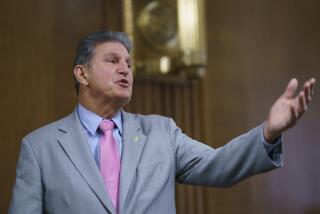Keynote Economist Calls for Huge Public Spending
- Share via
ANAHEIM — Probably it was the inexpensive hotel rooms, but perhaps it occurred to someone that American Economics Assn. members meeting in the shadow of Disneyland here could be lured into the sort of suspension of disbelief encouraged by theme parks.
A sense of fantasy also pervaded remarks by the AEA president, William Vickrey, 78,professor emeritus at Columbia University, in his annual presidential address to hundreds of economists.
“I hope I will be able to light a fire under them,” Vickrey--who has a reputation for making outrageous statements intended to shake up the thinking of students and colleagues alike--told a colleague before he began his talk.
Vickrey urged the group to stop worrying about budget deficits, a lack of national saving, inflation and the other standards on the economists’ list of concerns.
Instead, he said, they should get behind a program of massive government spending that could drive down the nation’s unemployment rate to between 1% and 2% over the next two or three years.
The nation has too much savings given the current depressed level of investment, he said. To bridge the gap that he says exists between saving and investment--a gap that he believes is a drag on the economy--the government needs to “recycle” the money involved by spending more, hundreds of billions of dollars more.
The government should spend enough to achieve an inflation-adjusted economic growth rate of 7% to 11% a year until full employment is reached, he said.
To keep inflation under control in such an economy, Vickrey proposed an economy-wide system of “warrants” that companies would have to have to allow them to increase their prices. The warrants could be freely bought and sold, so firms in strong markets could buy them from those facing competitive pressures too strong to raise prices.
The reaction of the economists ranged from slack-jawed surprise and anger to pleasure that Vickrey had not lost his penchant for outrageous remarks.
Still, his topic was on the agenda throughout much of this annual gathering of economists: How does one go about maximizing economic growth and reducing the losses inherent in high unemployment without immediately sowing the seeds of the next slump?
The profession has no firm answer. Repeatedly, economists said the advice given President-elect Bill Clinton at his Little Rock, Ark., economic conference about what policies he should adopt left much unsaid. There was frequent skepticism expressed that Clinton would be able to influence future economic growth significantly. Perhaps the world, like Disneyland, would turn out to be a happy place, economically speaking. But there was no sense of confidence here that it would.
More to Read
Get the L.A. Times Politics newsletter
Deeply reported insights into legislation, politics and policy from Sacramento, Washington and beyond. In your inbox twice per week.
You may occasionally receive promotional content from the Los Angeles Times.









